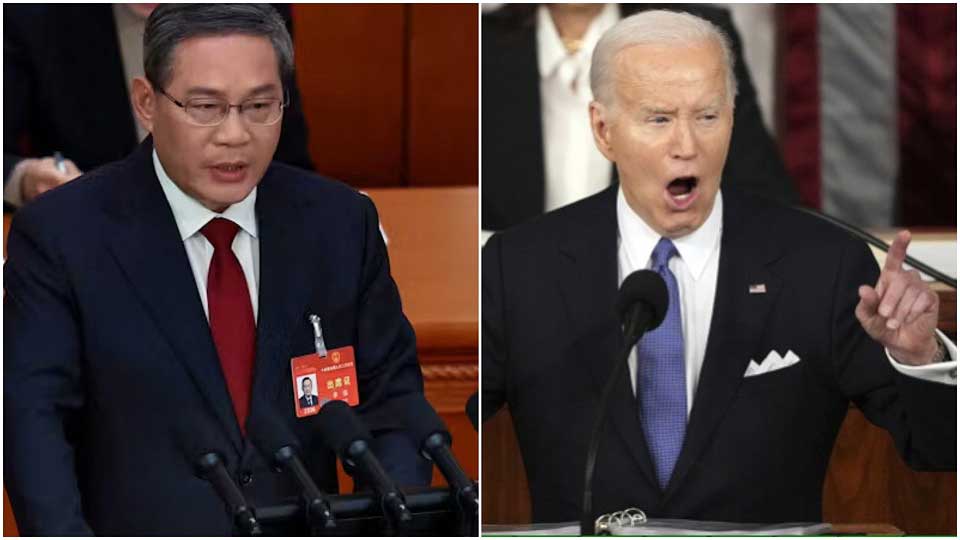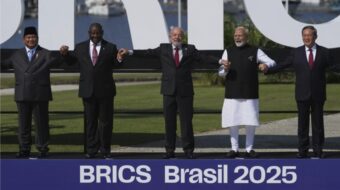
It may have been a coincidence, but the legislatures of the People’s Republic of China and the United States, the two most powerful economies on Earth, heard major speeches a few days apart designed to summarize government policies in the last year and plans for the future.
Premier Li Qiang addressed the National People’s Congress (NPC) and President Joe Biden gave his annual State of the Union address to a joint session of Congress.
The tone of the two meetings could hardly have been more different. The Chinese event was a sober, measured assessment of the country’s achievements that also analyzed its shortcomings.
The State of the Union address, on the other hand, came across more as a pep rally than as a serious analysis of U.S. society and administration policy. It was essentially the opening statement of Biden’s re-election campaign.
In Beijing, on Tuesday, March 5, Li spoke of the challenges that the country has to overcome. “We secured a smooth transition,” he said “in epidemic response following a major, decisive victory in the fight against COVID-19. The main goals and tasks for economic and social development in 2023 were accomplished, and we made steady progress in pursuing high-quality development, maintained overall social stability, and made solid advances in building a modern socialist country in all respects.”
China, he continued, saw the deepening of reform and opening up. Grain output reached record levels, “Thanks to further steps to prevent and control pollution, the discharge of major pollutants continued to fall and the quality of surface water and offshore water continued to improve.”
In the economic field, “Per capita disposable income of residents increased by 6.1%, and the income gap between urban and rural residents continued to narrow,” as shown by the increase in rural per capita income by 8.4%. “We increased subsidies for compulsory education, basic old-age insurance, and basic medical insurance and expanded the coverage of assistance and support.
None of this came easily. Li pointed out that, “Looking back at 2023, we can see we faced an array of interwoven difficulties and challenges… Globally, the economic recovery was sluggish. Geopolitical conflicts became more acute, protectionism and unilateralism were on the rise, and the external environment exerted a more adverse impact on China’s development.”
Li also laid out the “Overall Requirements and Policy Orientation for Economic and Social Development in 2024.” Briefly, its main points were:
- adhere to the general principle of pursuing progress while ensuring stability
- deepen reform and opening up across the board
- achieve greater self-reliance and strength in science and technology
- promote new urbanization and all-around rural revitalization in a coordinated way
- continue to effectively pursue higher-quality economic growth
- appropriately increase economic output
- improve the people’s wellbeing
- maintain overall social stability
Some of the goals outlined included:
- GDP growth of around 5%
- over 12 million new urban jobs
- growth in personal income in step with economic growth.
Though most of the report centered on domestic issues, Li mentioned China’s place in the wider world as well.
“We will stay committed to an independent foreign policy of peace and to peaceful development…. We call for an equal and orderly multipolar world and universally beneficial and inclusive economic globalization, and we are committed to promoting a new type of international relations. We will remain firm in opposing all hegemonic, high-handed, and bullying acts and uphold international fairness and justice.”
After his lengthy analysis of the goals and problems facing the Chinese people, their economy, and social development, Li concluded:
“A historic mission lies ahead of us, and we will endeavor to create a brighter future…[and] hold high the great banner of socialism with Chinese characteristics…. Let us forge ahead in full confidence and in a pioneering spirit to accomplish the objectives and tasks for this year’s economic and social development. Let us strive to build a great country and advance national rejuvenation on all fronts through Chinese modernization.”
Two days later, Biden gave his big speech. When he began, he was greeted with raucous cheers and applause (from Democrats.) “If I were smart,” he said with a chuckle, “I would go home now.” But he then got down to business.
“In January 1941, Franklin Roosevelt came to this chamber to speak to the nation, and he said, ‘I address you in a moment, unprecedented in the history of the union…’ Tonight, I come to the same chamber to address the nation. Now, it’s we who face an unprecedented moment in the history of the union. And yes, my purpose tonight is to wake up the Congress and alert the American people that this is no ordinary moment either. Not since President Lincoln and the Civil War have freedom and democracy been under assault at home as they are today.”
A full summary of the president’s remarks would go far beyond the scope of this brief synopsis, but here are some of his main points:
After a powerful beginning, much of the speech lapsed into a campaign-style stump speech. He referred repeatedly to “[m]y predecessor and some of you here” particularly those who defended the insurrection at the Capitol on January 6, 2021. “And make clear—political violence has absolutely no place, no place in America. Zero place.” Biden reminded the nation of Donald Trump’s recent statements about Ukraine, undocumented immigrants who want to enter the United States, as well as the 2017 $2 trillion tax package that mostly favored the mega-rich.
He went on to restate his support for reproductive rights, taxing the rich, bringing down prescription drug costs, and canceling student debt.
Biden restated his support of unions; good union jobs; introduced UAW president Shawn Fain, who was his guest; and called for the passage of the PRO Act (Protecting the Right to Organize). “The middle class built this country,” he stated, “and unions built the middle class.”
In addition, he discussed a whole range of important social issues, including tax reform, calling on Congress to pass legislation to increase taxes on those earning over $400,000 a year as well as corporations. “Look, I’m a capitalist,” he reminded everyone, “If you want to make, you can make a million or millions of bucks, that’s great. Just pay your fair share in taxes.”
The president paid homage to civil rights icon John Lewis and defended Social Security and Medicare (though he said nothing about the dangers of so-called Medicare Advantage). “If anyone here [in Congress] tries to cut Social Security or Medicare or raise the retirement age, I will stop you.”
The main weakness of the speech, however, was his defense of his foreign policy. He reiterated the basic talking points of U.S. imperialism: “Overseas, Putin of Russia is on the march, invading Ukraine and sowing chaos throughout Europe and beyond. If anybody in this room thinks Putin will stop at Ukraine, I assure you, he will not.” He repeated his call to “stand with Ukraine” and pass his weapons funding proposal. “And today, we’ve made NATO stronger than ever” with the recent additions of Finland and Sweden.”
As to the Israeli genocide against the Palestinians, he is trying to play both ends. “Israel has a right to go after Hamas,” he stated, but added, “Israel also has a fundamental responsibility, though, to protect innocent civilians in Gaza.” (Nowhere in his speech did he mention that he, as president of the United States, has more power than anyone else to end this horrific tragedy by cutting off all arms to Israel and clearly calling for a ceasefire.)
At a time when both the U.S. and China play a major role in world affairs, it is important that our two countries make every effort to bridge their differences, learn from each other, respect each other, and build a greater world for all of humanity. Biden’s comments about U.S.-China relations boiled down to two sentences.
“I want competition with China, not conflict,” he declared, but he couched his remarks in old-style Cold War rhetoric: “We’re in a stronger position to win the conflict of the 21st century against China than anyone else for that matter. Than any time as well.”
Despite Biden’s vision of unavoidable confrontation, differences in culture and political ideology can be overcome. Remember, China is being built on the foundations of a socialist revolution that triumphed 75 years ago, a transformation that is still not imminent in the United States.
Despite the profound differences between the two speeches, there are common interests that can form the basis for a sound, stable relationship between China and the United States—a cooperative relationship that could make our planet a better place for all.
Realizing that possibility means that the Biden administration—and future administrations—must turn away from the assumption of automatic confrontation and Cold War rhetoric.
As with all op-eds published by People’s World, this article reflects the views of its author.










